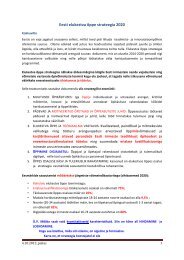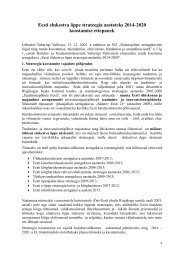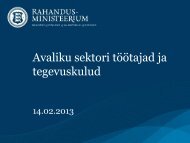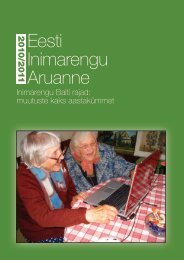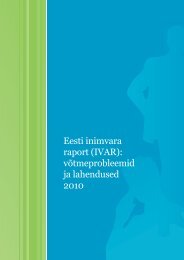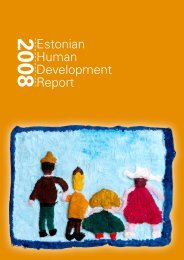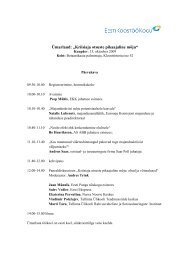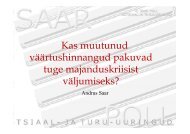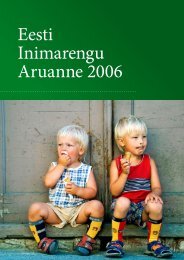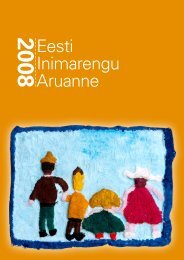DEVELOPMENT
The pdf-version - Eesti Koostöö Kogu
The pdf-version - Eesti Koostöö Kogu
You also want an ePaper? Increase the reach of your titles
YUMPU automatically turns print PDFs into web optimized ePapers that Google loves.
2.2<br />
Freedom and democracy<br />
Martin Mölder and Vello Pettai<br />
2.2.1<br />
Measuring democracy and freedom<br />
More indices have been compiled for the assessment<br />
of the democracy, freedom and other general social<br />
parameters than can be examined in a brief survey. The<br />
following describes and evaluates the Estonian position<br />
in four of the most popular indices, which all, in<br />
somewhat different ways, map political systems, as well<br />
as their perspectives of democracy and freedom in the<br />
broader context. These include the two indices compiled<br />
by Freedom House – Freedom in the World and<br />
Nations in Transit. The first is one of the best known<br />
indices used to measure democracy and freedom, and<br />
is noteworthy for the number of states and the scope of<br />
the parameters it utilises for its assessments. Nations<br />
in Transit is somewhat more focused, and somewhat<br />
more important for the evaluation of Estonia’s position,<br />
since it focuses on determining the situation and<br />
development level of democracy in the states that were<br />
once behind the Iron Curtain. Another index that is<br />
monitored is the Democracy Index, which appears in<br />
The Economist, the scope of which is comparable to the<br />
first index, and which is compiled for only four periods<br />
during the last six years. Also Estonia’s position<br />
in the Polity IV data series has been tracked, which<br />
is included as an index with a relatively specific focus<br />
on the democratic and autocratic traits of political systems,<br />
and which includes a wide spectrum of states,<br />
and is perhaps the most reliable and authoritative<br />
index from a social sciences point of view.<br />
The Freedom in the World 1 index has been compiled<br />
almost every year since 1973, and it currently<br />
includes 195 states and 14 disputed territories. The<br />
index reflects the political systems of the states and<br />
their broader functioning in society from the perspective<br />
of liberal democracy through two dimensions –<br />
political rights and civil liberties – which are divided<br />
into seven sub-dimensions (the electoral process,<br />
political pluralism and participation, functioning of<br />
government, freedom of expression and belief, rights of<br />
assembly and association, rule of law, personal autonomy<br />
and individual rights). These two dimensions,<br />
along with the seven sub-dimensions, are divided into<br />
ten and fifteen sub-questions, respectively, which are<br />
used to rate the states based on a five-point scale (0-4).<br />
The corresponding assessments are first compiled<br />
based on the seven sub-dimensions and the two main<br />
dimensions, and thereafter, aggregated into uniform<br />
numerical indicators, on a scale of 1 to 7. Based on<br />
this scale, the states are, in turn, divided into the following<br />
categories: “free” (1 – 2.5), “partially free” (3–5)<br />
and “not free” (5.5–7). Although, as the name says,<br />
the index measures freedom, it is essentially an index<br />
defining liberal democracy.<br />
Nations in Transit 2 is also an index for the assessment<br />
of democracy compiled by Freedom House,<br />
although its focus is somewhat narrower. The index<br />
has been compiled since the middle of the 1990s, and<br />
it concentrates on the assessment of the post-Communist<br />
states that developed after the end of the Cold<br />
War as a result of the collapse of the Soviet Union. The<br />
index covers 29 states and territories, starting in 1995,<br />
and focuses on the assessment of the elections, the<br />
media, civil societies, as well as local and national governments,<br />
court systems and levels of corruption, from<br />
the viewpoint of the development and consolidation of<br />
democracy. The states are rated according to the given<br />
dimensions on a scale of 1 to 7, and the corresponding<br />
assessments are aggregated into a uniform measure<br />
of democracy. Based thereon, the states are, in turn,<br />
divided into consolidated democracies (1.00–2.99),<br />
semi-consolidated democracies (3.00–3.99), hybrid<br />
regimes (4.00–4.99), semi-consolidated authoritarian<br />
regimes (5.00–5.99) and consolidated authoritarian<br />
regimes (6.00–7.00).<br />
The Democracy Index published by The Economist 3<br />
has been compiled four times, to date – for 2006, 2008,<br />
2010 and 2011. The index covers 167 states, and assesses<br />
the status of democracy by determining the condition of<br />
their electoral process and pluralism, the functioning<br />
of government, political participation, political culture<br />
and civil liberties. The Index relies on a total of twenty<br />
questions, and based on the answers, the states are<br />
assessed according to each dimension separately, and an<br />
average of all the dimensions is computed on a 10-point<br />
scale. Based on the results, the states are divided into<br />
full democracies (8.00–10.00), flawed democracies<br />
(6.00–7.99), hybrid regimes (4.00–5.99) and authoritarian<br />
regimes (1.00–3.99).<br />
Polity IV 4 currently covers 164 states, and<br />
includes the longest period of time – from 1800 to<br />
2010. The index, simultaneously, assesses the democratic<br />
and authoritarian traits of political systems on<br />
1 Available at: Available at: http://www.freedomhouse.org/report-types/freedom-world<br />
2 Available at: http://www.freedomhouse.org/report-types/nations-transit<br />
3 Last version available at: http://www.eiu.com/public/thankyou_download.aspx?activity=download&campaignid=DemocracyIndex2011<br />
4 Available at: http://www.systemicpeace.org/polity/polity4.htm<br />
Estonian Human Development Report 2012/2013<br />
67



